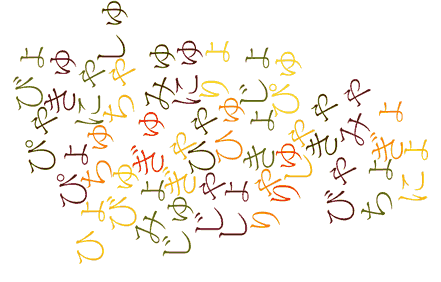Learn Japanese
| English | Japanese | |||
|---|---|---|---|---|
| Hello | こんにちは | |||
| Hello | おはよう | |||
| Good evening | こんばんは | |||
| Goodbye | さようなら | |||
| Goodbye | またね | |||
| See you later | また後でね | |||
| Yes | はい | |||
| Yes | うん | |||
| No | いいえ | |||
| No | ううん | |||
| Please! | すみません | |||
| Thanks | ありがとうございます | |||
| Thanks | ありがとう | |||
| Thanks a lot | どうもありがとう! | |||
| Thank you for your help | 助かりました、 ありがと うございます | |||
| Thank you for your help | 助かった、ありがとう | |||
| Don't mention it | どういたしまして | |||
| Ok | 了解です | |||
| Ok | オーケー | |||
| How much is it? | すみません、値段は いくらですか? | |||
| Sorry! | ごめんなさい! | |||
| Sorry! | ごめん! | |||
| I don't understand | わかりません | |||
| I don't understand | わからない | |||
| I get it | わかりました | |||
| I get it | わかった | |||
| I don't know | 知りません | |||
| I don't know | 知らない | |||
| Forbidden | 禁止 | |||
| Excuse me, where are the toilets? | すみません、 トイレはどこですか? | |||
| Happy New Year! | 明けまして おめでとう ございます! | |||
| Happy New Year! | 明けまして おめでとう! | |||
| Happy birthday! | お誕生日 おめでとう ございます! | |||
| Happy birthday! | お誕生日 おめでとう! | |||
| Happy holiday! | よいお年を! | |||
| Congratulations! | おめでとうございます! | |||
| Congratulations! | おめでとう! |
How to learn Japanese by yourself? Start with an easy and free online course!
We have adopted an objective and efficient approach to learn how to speak a language easily and quickly: we suggest you to start by memorizing words, phrases and practical expressions that you can use in everyday life and that will be useful when traveling.
Getting used to pronounce words out loud, numbers for instance, is an easy exercise that you can often practice and at anytime throughout the day.
It will help you to get used to the sounds of your chosen language and thus make it more familiar.
And once your holidays have begun, in Tokyo, Osaka or elsewhere in Japan, you will be surprised how familiar and easy to understand it will seem.
Furthermore, using a pocket dictionary is always useful, particularly during a trip. It enables you to find the translation of new words and enrich your vocabulary.
Why speak Japanese when traveling?
At the crossroads of tradition and technology
Formed by more than 6,500 islands, Japan is one of the world's largest economic powers, and companies such as Toyota, Honda, Canon, Panasonic, Sony and Nintendo are world famous. Investment in research plays an important role in many areas - including robotics - in which Japan is one of the most advanced countries in the world.
The quality of life in the land of the rising sun is one of its remarkable characteristics and reflects its place in the HDI rankings. Japanese life expectancy is very high.
In relation to tourism, the rich cultural heritage brings together the curious and passionate from all over the world, who come to see the country's natural and architectural heritage, such as Mount Fuji, imperial palaces, Buddhist temples and gardens, as well as museums where it is possible to discover the development of ceramics, calligraphy, literature and forging - including samurai swords.
The popular culture of the late twentieth and twenty-first centuries is also marked by the popularity of Manga and animations, not only in Japan and Asia, but also in many countries. In addition, Japanese gastronomy is also very popular and can be enjoyed around the world.
Make a success of your stay in Japan
Whether you are going to spend a few days with friends for a leisure trip or if you are on a business trip, nothing will be more useful to you than to be able to slip a few words in the language of your interlocutors, who will appreciate your effort and will be certainly more willing to help.
How to succeed in having good pronunciation within a week to a month?
It's easy, but you have to train yourself!
In the course of history, Japanese has been enriched by borrowing from other languages such as Chinese and English. The graphic system is divided into two sets, the Kanji of Chinese origin and the Kanas, in turn divided into katakanas (used to write the words of foreign origin) and hiraganas.
Spoken by about 130 million people, the language is characterized by the importance of the formulas of politeness that depend both on the speaker and the subject.
The pronunciation of Japanese does not present great difficulties, but you must know the rules and keep training yourself. The vowel system contains the short vowels A I U E O.
Long vowels are formed by the contiguity of short vowels. There are no nasal vowels. There are also two semi-vowels, the Y and the W, which are always placed before the vowel.
The association of a consonant to the letter groups YA, YU and YO forms the voiceless consonants, such as KYA, SHU, CHO and PYU. Usually, consonants have only one pronunciation. It should be noted that the R will always be read as an L and that the W is pronounced like the OU in English.
We invite you to listen to the pronunciation of the letters by clicking on the following link: Japanese alphabet with audio.





